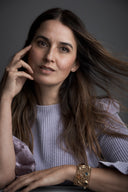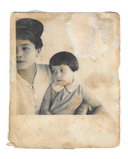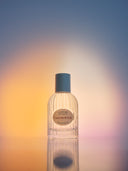Complimentary Shipping


AERANAUT 04: Kathleen Baird-Murray
Writer, Entrepeneur and Perfumer
HEAVEN SCENT
British-born Writer Kathleen Baird-Murray took a long career in beauty journalism and turned it into a unique new fragrance.
Creativity takes many forms and the drive to do something new, something better, is the adrenaline that carries the truly determined, across multiple disciplines. From a rough idea on the back of an envelope to a fully fledged brand, as a writer, London based Kathleen knows a thing or two about fragrances. As a veteran journalist for British Vogue and multiple luxury titles, she is used to interviewing and profiling the top names in the multi billion dollar beauty and fragrance industries, analysing, explaining and demystifying their products. Here, increasingly big budgets and big names dominate. But when she decided to set up her own company, La Pyae Apothecary, as a sole founder and without major financial support, her approach was deliberately simple.
She started with the fragrance, Catch Me If I Fall, which was inspired by her Anglo-Burmese heritage, which debuted in October 2024. This gave Kathleen a focus, and a single purpose, that has driven her, with the support of friends and major names in the industry, to start something very special. Here she explains the process that led to the launch and where it might go from here.
Kathleen, how did your brand, La Pyae Apothecary, get its name?
La Pyae is the Burmese, phrase for “full moon” and was the nickname of one of my cousins in Myanmar where my mother was born. I've got loads of cousins there who I connected with 30 years ago, when I first visited.
That must have been an experience.
I was the first person to see my mother's family. She'd been separated from them for about 50 years as she left after the Second World War to live with her Irish grandmother and sister in Dublin. We became quite close, and they would come over here to the UK. It was a massive gift, you know; on the one hand I had this this kind of very traditional English existence, but then I had this other side that was just exciting and colourful and smelled beautiful; later I took my own kids back there. They were just as touched as I had been by how kind all our Burmese family were.
Quite a contrast to life in the UK!
I had a very English life. I grew up in Maidstone in Kent. We had roast chicken for lunch every Sunday. We didn't eat Burmese food. My mother came from a generation that had to completely assimilate, when she moved from Myanmar to Ireland, which was tough. So, she buried all of that background. It was only when my brothers and I were growing up, that it resurfaced with us. We asked her to write it all down so that we could understand what it's all about. She went as far as publishing her memoir and that was great for us; it was like being handed a guidebook of where we had come from. (The Book is Maureen Baird-Murray: A World Overturned, 1997) By the way, in case you’re wondering what to call it, the official name is Myanmar. It was the British who called it Burma after the largest ethnic group there, but most Myanmar people prefer the “new” name. I use both, as some people outside of Myanmar still don’t know it by its new name.




So that gave you an entrée into your family background in Myanmar?
It certainly made it less of a mystery, but we just didn't really have any connection with that culture at all. So, I went there, when I was 26 and just starting out as a journalist. I was working predominantly in magazines and writing about beauty, and I would go to press launches. I would say ‘Well, what about some of these ingredients? because people over there use them, and they're really good for you’ And people just didn't know where Myanmar was, but they were interested. I kept thinking about it and all the colors and all the incredible scents and went back a couple more times.
What struck you most about Myanmar?
Everybody is very calm; they had such a good sense of humour. You know, they don't react to crises the same way that we do. Once I was in a van with my family and there was a flat tyre, if we’d been in the UK we’d have been swearing and stressed about it. Over there, they're just much more Buddhist and Zen about everything. It's very humbling when you realise how impatient your life experience makes you, how dissatisfied you are with everything. Of course now, since the military rule has returned, there is a civil war and things are very tough for everyone.
This Burmese connection has stayed with you clearly. How did that translate into La Pyae?
So, our connections grew, and I kept thinking about it. It was actually nine years ago that I had the first conversation with the perfumer Frank Voelkl. That was a very lucky moment. I had interviewed so many perfumers, as part of my job. But I really wanted Frank, because he created Santal 33 for Le Labo, and I really liked that fragrance. I think everybody loved that fragrance then. I was friends with Fabrice Penot, who is one of the co-founders of Le Labo. And I asked Fabrice for an introduction to a perfumer who would really interpret this story very well. And he suggested somebody else to me. And I thought, okay, well, I can't really ask him for Frank, because Frank's such a big hitter, that’s probably commercially too big an ask. Luckily for me, the other guy didn't email me back. So, I asked Fabrice if he could suggest anyone else, and finally he said, Frank.
What’s special for you about Frank Voelkl?
Firstly, Frank is German; he's definitely not your typical French perfumer. He doesn’t talk about seduction or sensuality in that French way. He has a different way of working. He likes to work with a mix of naturals and synthetics. I like that, because you can play more with certain things, and you can have longer lasting trails, and it's better for the planet in some instances.
How did you explain your goals with the fragrance to Frank?
Myanmar is a cocktail of everything, colours, scents, moods. You see gold leaf at the Shwedagon Pagoda in Yangon, but right next to it, you'll see a green neon sign flashing. I liked the discordant nature of it all and wanted to get these sorts of contrasts. For me, the fragrance is about Myanmar but you don't have to know or even be interested in that country to love the scent, it will just draw you in.
What were the vital ingredients of Catch Me If I Fall for you?
Frank asked me all about the smells that were important to me from that country. I told him I really wanted something that smells of jasmine, because my mother told me that her mother would wear strings of Jasmine petals threaded together, and also in her hair. I wanted something that reminded me of that. But I didn't want a typically heavy tuberose or anything like that, because I didn't want it to be heavy or cloying. I wanted this to feel fresh.
At Aera, we like to think the design process is about subtraction and simplification. Fragrance is so subjective it seems to be as much about knowing what you don’t need as is it about what you like....
Yes. As a writer, you're constantly getting rid of stuff, and that's the hardest thing sometimes, you write a little bit of word salad that you're quite pleased with. But you have to be able to say to yourself, “This is rubbish, take it out”. But for the fragrance I didn’t have to do that, working with someone like Frank. You don't really need to do that because he's so good at what he does, so it’s very collaborative
Did you know therefore what wouldn’t be in the fragrance?
There are a lot of things in fragrances that I don't like. There has been a trend lately in all those commercial blockbuster hits that are so sweet. They've got so much vanilla in them and I can't bear anything like that. We talked a lot about the smells that I like and some of the fragrances that I've loved over the years. I was sure I didn’t want it to feel like a classic French fragrance. I wanted it to have a slight roughness at the edges, that raw quality you get with those sort of dusty, bumpy roads when you're in Myanmar and he really went with it.
How would you explain the fragrance?
When you smell it first, you get a buzz of bergamot, zest and cardamom pods. It's got Neroli and green leaves. So that's where you get that fresh kind of fizziness, almost a slight sharpness. And then the middle bit, which I like to think of as its beating heart, is jasmine sambac, a type of jasmine. Then there’s ambrette, as well as freesia and iris. And then at the base, which I call its grounding hug, you've got cedar wood, sandalwood and white musk which gives it the warmth and a sort of creaminess as well.
Was it a long process?
Actually, it wasn't! You know, how people always say, oh, it takes hundreds of attempts. And it really didn't; we did it probably in about three, maybe four. Although for each of those attempts that I was trying, there were perhaps 20 back in the laboratory that I wasn’t smelling!


How did you get here?
I have been a journalist now for about 30 years. I mean, I've done a few other things, but they're always about words - screenplays, novels, podcasts. And I fell into writing about beauty, I guess the same way that other writers find different niches within journalism; I like interviewing the characters in that world.
What is it about fragrance in particular that captivates you?
I think fragrance is magical. It is all about those connections with memory. It’s similar to fashion, emotionally, but it's so close to your skin, close to everything that's personal about you. Fragrances are really like music. They make you feel a certain way, and connect you with people that you love, memories that are dear to you. I feel quite protected when I put on Catch Me If I Fall I can go out into the world and I feel great, especially actually going somewhere really public, like the underground.
How did you test out your new fragrance?
I had to go and interview a Master Perfumer who was the perfumer for a big fashion house based in Grasse. Before I interviewed him, I took a sample of the fragrance that Frank had made, and I doused myself in it liberally. I wanted to see if he would say anything. Right away he asked me, “What are you wearing?” I told him it was a little something that I made with a perfumer, and he asked “What's in it? I can smell....Is there fig?” I said no, no, not fig. It's Jasmine. And I told him all the notes. And he just said, “Pas mal, pas mal...”
Damning with faint praise?
Well, I thought, okay, hmm, “not bad, not bad”. But, right at the end of the interview, he said, “I can still smell it. And by the way, ‘Pas mal’ in French, means ‘very good”. That gave me a big boost. Over time, lots of people have said when they smell me wearing it, ‘Well, you have to bring this out. When are you going to do it, I want to buy it’. So that's been really exciting as well. I've also had so much support and so much goodwill from the photographers who created our visuals for us, Metz and Racine to two amazing PRs who stepped forward to tell me that they're going to help me with everything. My son made our campaign video. I have so many mentors and other founders in the beauty industry who have helped me. People have just been so kind and so generous.
Are you learning new skills now you’re on this side of the business?
I mean, we're doing everything on an absolute shoestring, which is good, in a way, because you’re able to find your feet. You have to be quite resourceful. There are the things that, you know you're good at as a journalist, and then there are bits that your head just isn't equipped for, or at least, my head isn’t equipped for, like logistics and boxes arriving late and bottle caps not fitting. So you find someone who is good at those bits, and that way you move forward.
Writing about beauty and fragrance must have given you an advantage in knowing what was possible...
It's amazing what you can do actually, because of the access that you have. The fact that I even got to Frank was incredible. But I still needed to raise the funds, and that is something that as a woman it turns out is next to impossible. In the first half of 2024 all female-founded businesses received just 1.8% of funding, down from 2.5% in 2023.
But I'm happy that it has taken a long time. I'm also happy that it's just one fragrance because I feel that, you know, there's a big trend at the moment to bring out say, eight fragrances at any one time, and that, for me, is just way too much choice. Choice is the modern curse in the modern world, in fashion and food....even in coffee. It takes a lot of determination to just stick to one thing.
Aera’s core tenet is that time well spent is the ultimate luxury. And creativity is about living in that Zen moment. At what point in your process are you loving it?
I am honestly so happy doing this. There have been painful moments, things like logistics that aren’t in my comfort zone necessarily. But what I'm really enjoying about it is the opportunities, the doors it’s opening for me. We opened in New York at the Hotel Chelsea; in Yangon, Myanmar we are working with the Governor’s Residence to support a local charity; we have an incredible relationship with Estelle Manor in Oxfordshire, whose founder Eiesha Bharti Pasricha was one of the very first people to smell Catch Me If I Fall, and who championed us instantly. The feedback I get from customers, male and female, from my new community, is so heartwarming - they write saying it’s the fragrance they’ve been looking for all their lives. As a writer, you look constantly for opportunities to create something new and to feel reinvigorated, and Catch Me If I Fall is writing new stories for me every day.




